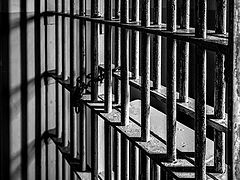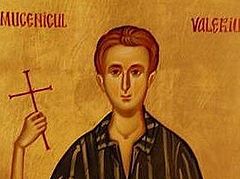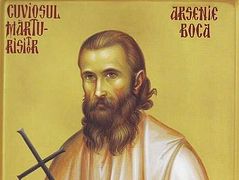In the cemetery of the Dormition of the Mother of God in the suburbs of Bucharest, Romania, in a small crypt lie the incorrupt relics of Fr. Ilie Lăcătușu, one among the many confessors of the communist prisons. Since September 29, 1998 when his relics were exhumed, multitudes of faithful Christians have headed towards his reliquary, telling him their pain and sorrows. His body weighs eight kilograms and all the characteristics of holy relics: incorrupt, fragrant, dry and light, hazel-colored skin, preserving their features, not evoking fear but rather spiritual joy in those who gaze upon them, and giving the impression of a man who is asleep.
Fr. Ilie was a priest who was sanctified not in the middle of the wilderness, but amidst communist persecution, enduring with humility and without compromise the humiliations of prison life. He was arrested different times and experienced the harsh regime of Canal, being included in a brigade of priests destined for extermination. After working in the labor camps of Galeș and Peninsula, he became gravely ill and was sent to Târgu-Ocna, where he found an atmosphere of prayer and brotherly love. Liberated for a short period of time, he was arrested again and sent to Periprava in the Delta region where he displayed a measure of spiritual discernment. Elder Iustin Pârvu was also there at that time and related events worthy of inclusion in The Lives of The Saints—great miracles that God worked in the camps for those who were confessing Him.
Fr. Ilie Lăcătușu remained in the memory of those who knew him as a man of prayer. Those who had eyes to see observed that being indifferent to the things happening around him, he kept his mind unceasingly in God, Whose Name he called upon at all times. He did not speak much, but his words had great power, transmitting grace to those who listened to him. He supported with prayer and his words, with meekness and kindness, many weak souls on the road to Golgotha, raising them towards God. After his release he worked for a time as a brick-mason at Bolintin, near Bucharest. The Lord wanted to refine his servant in the furnace of temptations, and as another Job, his children were taken from this life one by one, leaving only one girl behind out of the five that he had. Fr. Ilie also received this trial with faith, giving himself entirely over to the will of God. After several years he took up again with humility the service of the priesthood in the villages of Gârdești and Cucuruzu, becoming an example of prayer and good works to the faithful Christians there.
The Spirit of God was with Fr. Ilie, as the Lord says, “But on this one will I look: on him who is poor and of a contrite spirit.” (Isaiah 66:2)
In The Frozen Mountain Lake: The Testimony of Elder Iustin Pârvu
I stayed with Fr. Ilie Lăcătușu for four years at Periprava in the Delta region. He was distinguished in general through his inner strength and silence. It was rare to hear him speak, but when he did his words had great importance. Most of the time he exhorted us to pray when we were in some danger. Concerning this man I can say in truth that he had the gift of humility. Seeking all the time to go unnoticed, he bore himself as the most insignificant man.
I want to tell you what happened on January 30, 1962, the feast day of the Holy Three Hierarchs Basil, Gregory, and John. It was a foggy and cold morning—a fog and humidity that struck the whole body. We were clothed in striped uniforms characteristic of prisoners: only a coat and a torn shirt, which we wore whether it was more than one hundred degrees or less than zero degrees outside. It was in the middle of winter during a terrible frost. The authorities were very threatening on the morning that we left the colony heading towards the work site. I had never before seen them riding horses, but this time all of the guards were mounted and armed with pistols.
To our surprise, less than two hundred meters away from arriving at the usual location where we would collect reeds destined for Germany, they oriented us in another direction. In that direction was to be found a lake about ten acres in size, and in the center of the lake grew a bunch of reeds, a beautiful bunch, dense and numerous. And, my dears, once we arrived there, each one of us was ordered to enter the lake and to bring back two bunches of reeds. I remember asking, “Sir, how can we enter directly into the water?! We are not capable of cutting the reeds there!” We usually walked on top of the ice to do the harvesting; this was the way we had worked until then. “If anyone of you argues and does not get into the water, we will shoot you on the spot!” Yet Fr. Ilie had a word that was very firm, and he encouraged all of us to bravery. “We will get into the water because these men have evil intentions; they will shoot us. Let us enter into the water, for the Mother of God and the Holy Three Hierarchs will pull us out unharmed.” And so we did, saving ourselves from this very dangerous situation.
First we entered up to the ankles, then up to the knees, then the waist, and finally we reached the spot where we needed to begin cutting. The cold water struck us to the bone. We all had in mind the Forty Martyrs of Sebaste. “It’s okay,” we thought, “we will be victorious!” Each one of us collected a stack of reeds and returned. But it wasn’t enough, they wanted another one. They started to pull the trigger in order to intimidate us. We went, collected another stack and afterwards another. It was around noon when we completed the third stack. What is important, though, is when we returned with the last one, the sun came out, illumining and warming the surroundings to eighty degrees Fahrenheit. It was a miracle which brought us the greatest joy. And then I said that Fr. Lăcătușu is a special man. I’m telling you that not one of us became sick or needed to be hospitalized; it was nothing. This was all due to the prayers of Fr. Ilie, otherwise we would have all been dead.
The guards became embittered and left us there. The warmth was becoming stronger and stronger. We squeezed the water out of our clothes, washed ourselves, and dried ourselves on the road back to the labor camp. I left there with the emotion that because of our inability to endure any longer, God worked a miracle. But what do you think that those wretched ones could have said? When they saw that after a few days not one of us was becoming sick, they surely thought in their amazement, “These bandits are truly miserable, even God is with them!”





